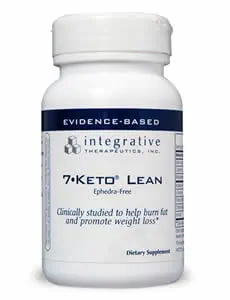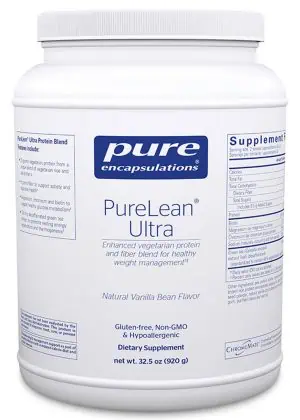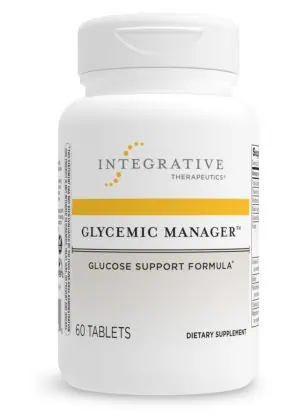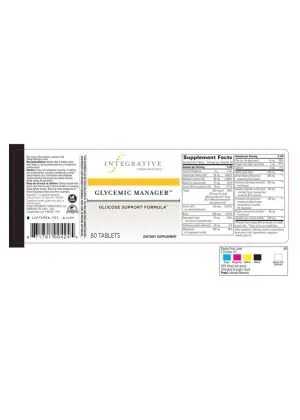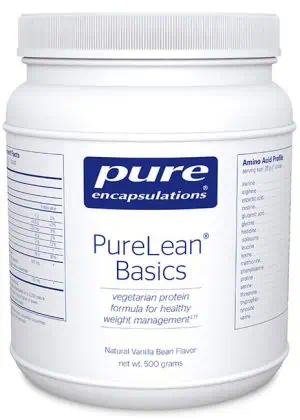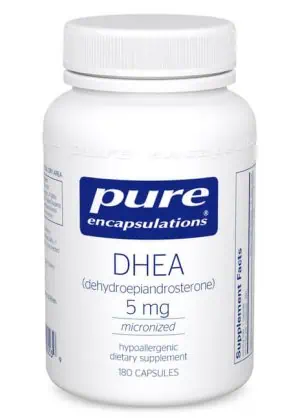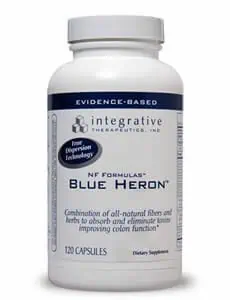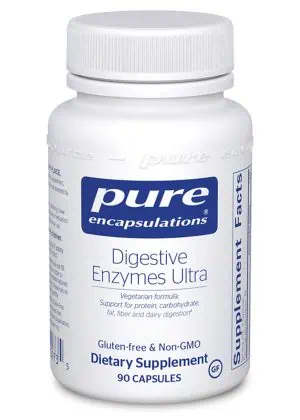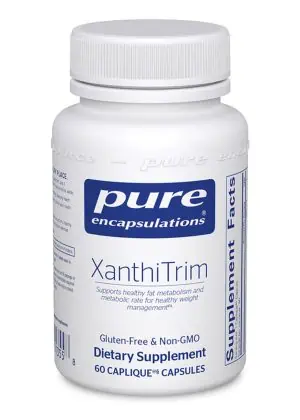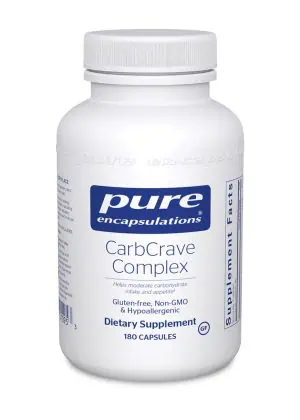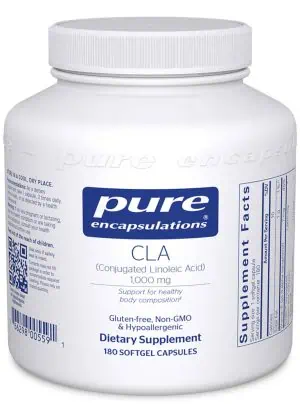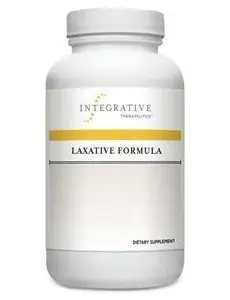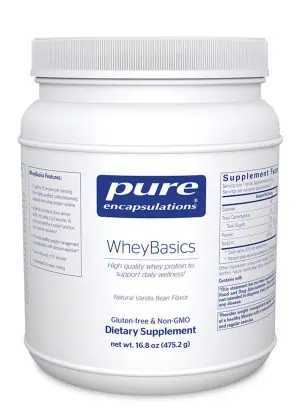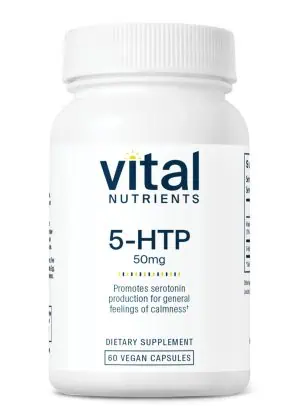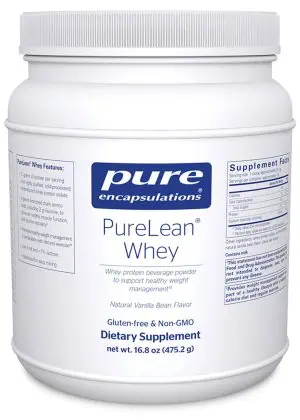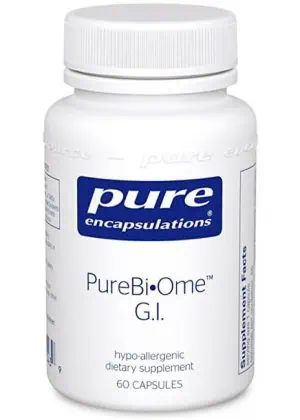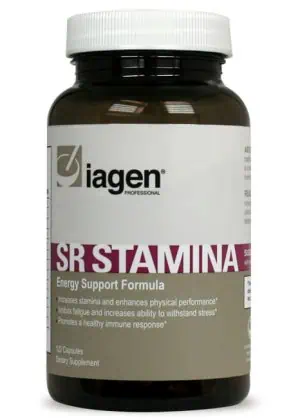7-Keto® Lean
Suggested Use: Take 1 or 2 capsules daily or as recommended by your healthcare practitioner.
How Does It Work?
7-Keto Lean is a dietary supplement that combines 7-keto DHEA, a naturally occurring metabolite of DHEA (dehydroepiandrosterone), with seven other ingredients to support healthy thyroid function and metabolism.†1,2 The combination has been clinically shown to enhance weight loss when used in conjunction with a healthy diet and exercise program.†
Mechanisms of action
Both DHEA and 7-keto DHEA support essential physiological functions, most notably in the immune and neurologic systems.† In the human body, DHEA converts into various metabolites, including 7-keto DHEA and steroid hormones, such as testosterone or the estrogens (estrone and estradiol).7 However, the 7-keto form of DHEA does not convert to active testosterone and/or estrogen in the body, 4,5 nor does it convert back to DHEA. In fact, this improved form of DHEA has no known adverse effects.†4,6
Research has shown that 7-keto DHEA increases thermogenic activity, which may enhance the body’s basal metabolic rate, helping to promote weight loss independent of alterations to caloric intake or activity levels.†5,8-10 Additionally, 7-keto DHEA has been shown to support healthy thyroid function.†11
Clinical studies
In a double-blind study (n= 30), subjects completed a protocol of controlled diet, exercise, and supplementation with 3-acetyl-7-oxo-dehydroepiandrosterone (7-keto-DHEA).3 Subjects randomly received either 7-keto DHEA (Group 1; 100mg twice daily) and/or placebo (Group 2) for 8 weeks. All subjects participated in an exercise-training program 3 times per week. Each exercise session consisted of 60 minutes of cross-training (aerobic and anaerobic exercise) under the supervision of an exercise physiologist. The diet comprised approximately 1800 kcal/day (20 kcal/kg body weight/d] and was supervised by a registered dietitian. Subjects received biweekly dietary counseling to encourage compliance. Study participants underwent serum multiple-assay chemistry testing, as well as body composition, blood pressure, and dietary analysis at baseline, week 4, and week 8.
Subjects taking 7-keto-DHEA lost a significant amount of body weight compared with those taking placebo (-2.88 kg vs -0.97 kg; P = 0.01) over the 8 weeks. The supplemented group also achieved a significant reduction in body fat compared with the placebo group (-1.8% vs -0.57%; P = 0.02). The rate of change in body fat per 4-week interval in Group 1 was 3.1 times that in Group 2 (-0.88% vs -0.28%; P < 0.01). Group 1 also experienced a significant increase in triiodothyronine (T3) levels compared with Group 2 over the 8-week study period (+17.88 ng/dL vs 2.75 ng/dL; P = 0.04). No adverse effects were reported throughout the study.
In an earlier eight-week clinical trial of similar design, supplementation with 7-keto DHEA (200 mg/day), in conjunction with diet and exercise, significantly reduced both body weight and body fat.† 7-keto DHEA also supported healthy thyroid hormone (triiodothyronine or T3) levels, which may affect basal metabolic rate, further enhancing weight loss.†11
Other ingredients in 7-Keto Lean include:
L-Tyrosine, an essential nutrient required for thyroid hormone formation.†12,13
Asparagus extract, a potent metabolic detoxifier that supports healthy fluid balance.†14
Choline, a nutrient involved in many important metabolic functions, including fat transport and metabolism.†15,16
Insoitol, which promotes the transport and metabolism of fat.†17
Copper, an essential trace mineral and cofactor of enzymes involved in carbohydrate and fat metabolism.†18
Manganese and iodine, essential nutrients required for healthy thyroid hormone metabolism.†12,13,19,20,21
Recommendations
Take 1 or 2 capsules daily or as recommended by your healthcare practitioner.
Precautions
If pregnant, nursing, or taking prescription drugs, consult your healthcare practitioner prior to use.
References Parker LN. Adrenal Androgens in Clinical Medicine. San Diego, Calif: Academic Press, Inc.; 1989:14. Marenich LP. Excretion of testosterone, epitestosterone, androstenedione and 7-keto-dehydroepiandrosterone in healthy men of different ages. Probl Endokrinol. 1979;25:28-31. Zenk JL, Helmer TR, Kassen LJ, Kuskowski MA. The effect of 7-KETO NaturaleanTM on weight loss: a randomized, double-blind, placebo-controlled trial. Curr Ther Res. 2002 Apr;63(4):263-72. Weeks C, Lardy H, Henwood S. Preclinical toxicology evaluation of 3-acetyl-7-oxo-dehydroepiandrosterone (7-keto-DHEA). FASEB J. 1998;12:A764. Proceedings Abstract (4428). Lardy H, Partridge B, Kneer N, et al. Ergosteroids: induction of thermogenic enzymes in liver of rats treated with steroids derived from dehydroepiandrosterone. Proc Natl Acad Sci U S A. 1995;92:6617-6619. Proceedings Abstract. Davison MH, Weeks C, Lardy H, et al. Safety and endocrine effects of 3-acetyl-7-oxo-DHEA (7-keto-DHEA). FASEB J. 1998;12:A764. Fleming T, ed. DHEA (dehydroepiandrosterone). In: PDR® for Nutritional Supplements. Montvale, NJ: Medical Economics Company; 2001: 127-131. Su CY, Lardy H. Induction of hepatic mitochondrial glycerophosphate dehydrogenase in rats by dehydroepiandrosterone. J Biochem. 1991;110:207-213. Bobyleva V, Bellei M, Kneer N, et al. The effects of ergosteroid 7-oxo-dehydroepiandrosterone on mitochondrial membrane potential: possible relationship to thermogenesis. Arch Biochem Biophys. 1997:341:122-128. Lardy H, Reich IL. 5-androstenes useful for promoting weight maintenance or weight loss and treatment process. 1996. United States Patent: 5506223. Colker CM, Torina GC, Swain MA, Kalman DS. Double-blind study evaluating the effects of exercise plus 3-acetyl-7-oxo-dehydroepiandrosterone on body composition and the endocrine system in overweight adults. J Exercise Physiol Abstracts, 2nd ASEP Annual Meeting, 1999: Abstract 30. Available at: http://faculty.css.edu/tboone2/asep/colker2.pdf [Accessed 1/25/11]. Johnson LR. ed. Thyroid gland. In: Essential Medical Physiology. 2nd ed. Philadelphia:Lippincott-Raven Publishers; 1998:521-535. McNabb FMA. Thyroid hormones, their activation, degradation and effects on metabolism. J Nutr. 1995;125:1773S-1776S. Fleming T, ed. Asparagus Officinalis. In: PDR® for Herbal Medicines. Montvale, NJ: Medical Economics Company;1998:673-675. Combs GF, ed. Choline. In: The Vitamins. Fundamental Aspects in Nutrition and Health. San Diego:Academic Press, Inc.; 1992:401. Shronts EP. Essential nature of choline with implications for total parenteral nutrition. J Am Diet Assoc. 1997;97:639-646,649. Combs GF, ed. Inositol. In: The Vitamins. Fundamental Aspects in Nutrition and Health. San Diego:Academic Press, Inc.; 1992:419. Linder MC. Copper. In: Ziegler EE, Filer LJ, Jr., ed. Present Knowledge in Nutrition. 7th ed. Washington, DC: International Life Sciences Institute; 1996:310. Eder K, Kralik A, Kirchgessner M. The effect of manganese supply on thyroid hormone metabolism in the offspring of manganese-depleted dams. Biol Trace Elem Res. 1996;55:137-145. Aihara K, Niahi Y, Hatano S, et al. Zinc, copper, manganese, and selenium metabolism in thyroid disease. Am J Clin Nutr. 1984;40:26-35. Marieb E. Minerals. In: Human Anatomy and Physiology. San Francisco, CA: Pearson Benjamin Cummings; 2004:9
Product Ingredients
| Ingredients | AMT | %DV |
|---|---|---|
| Iodine (from potassium iodide) | 100 mcg | 67% |
| Copper (as copper gluconate) | 500 mcg | 25% |
| Manganese (as manganese Krebs cycle chelates)** | 500 mcg | 25% |
| Asparagus (Asparagus officinalis) Rhizome Extract | 100 mg | - |
| L-Tyrosine | 100 mg | - |
| 7-keto DHEA Acetate (7-KETO® brand) | 100 mg | - |
| Choline Bitartrate | 50 mg | - |
| Inositol | 50 mg | - |
Why Buy From Us?As a trusted family- and employee-owned company for over 25 years, we've shipped more than 1 million packages, empowering our customers with expert knowledge, guiding their wellness journeys, while delivering unparalleled customer service.

Welcome to Pure Prescriptions
I founded Pure Prescriptions after overcoming Cancer at age 29, a battle that taught me the power of natural supplements and inspired me to make professional-grade, doctor-only brands accessible online—pioneering the industry over 25 years ago.
Today, still a family- and employee-owned company, we've shipped over 1 million packages, empowering countless wellness journeys with science-backed, U.S.-manufactured vitamins and supplements meticulously curated for superior quality and optimal results. Our real health experts provide personalized recommendations without upsells or gimmicks—just genuine support tailored to your needs.
Not a customer yet? We'd be thrilled to earn your trust and guide you toward vibrant health.
Sincerely,
Helpful Links:
Contact Us | LIVE Chat | Vitamin Quiz
The Pure Prescriptions Difference
When you choose Pure Prescriptions, you become part of our caring community. We’re committed to enhancing your wellness with personalized service, expertly selected products, and a dedication to your health & happiness.


Related products
Get Notified When Back In Stock
Verify you are Human:
-
- Vitamin Quiz
- Deals
- Shop
- Brands
- Shop by Manufacturer Brand
- Shop by Manufacturer Brand
- About
- Login
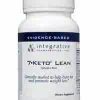
Out of stock





